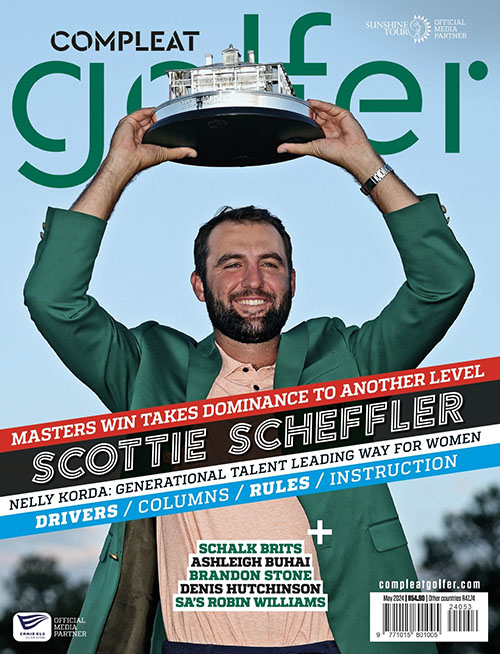Our Big Issue article on Slow Play sparked some debate from our readers. WADE PRETORIUS responds to some of the comments, criticisms and solutions.
The original article: Is slow play ruining the game?
Tim Kelleher: Too many golfers are just not ready to play when it’s their turn – they still have their glove off, checking yardage devices, etc. Slow walking between shots, or sharing a cart and going on safari (driving to both sides of the fairway). Marking scorecards on the green before moving off to the next tee box and commentary of the expedition. Should be walking up quickly and start planning your shot ASAP (as soon as you can when you are approaching your ball) – make sure that your glove is on …. just be more organised. Mark the card at the next tee box – it’s in the rules. It should be also compulsory for a 4 ball of visitors to take a caddie/spotter.
WP: Not much to add to this. It’s the little things done over and over in a round that can spoil the day for many in the field. When I was first introduced into the game I was taught to walk fast, concentrate on the shot and then walk fast again. The days of only hitting when you are furtherest from the hole are slowly coming to an end I think, ‘ready golf’ is the only way forward.
Erhardt Matthys Snyman: As a new golfer it is really difficult to play quickly. If I shoot a 102 that means I did almost 50% more strokes than a scratch player. I’m picking up when I can’t score, I have tried to be as ready as I can be but still I am hitting many more strokes as a good golfer. Add the fact that a few buddies also started playing and now we have a slow four ball. Does that mean it is justified to be harassed by the marshal?
WP: It’s wrong to say you would hit 50% more shots. Maybe 20-30% more but then, most of those I would argue are from 100 metres into the green – think about the number of duffed chips, taking two or three to get out of the sand, the horrid bladed pitch that flies the green and the three putts. That’s where the majority of the shots are played. It’s good to hear that people are still picking up when they can’t score and even better than new people are playing but let’s work together to make sure you play as quickly as possible. And improving around the green will not only lower your scores but also your time spent on the course. Marshalls have a tough job but keeping the field moving in good time is vitally important.
Ashley Govender: People can make every excuse, one of the biggest causes is arrogance! Simple! The guys in the front have the idea that they paid the price so they will take their time and enjoy it. I have heard that excuse enough times, also 80% of golfers do not respect the etiquette of golf. If your four-ball or two ball is slow, let the faster guys behind you pass. Don’t search for a ball for over five minutes and If the club is playing stableford don’t play medal and be the cause of slowing down play.
WP: Two things. One, I didn’t know people still remembered that it’s okay to let faster players through. And secondly, are clubs still fining players who play slowing at prize giving (granted, that only applies to competition days and slow play is not confined to those rounds.) in the light-hearted way that also makes them conscious of their day?
Jaco de Bruyn: A lot of people act as if you are stiff or mood spoiler when you ask them to speed up play. Every club should give every player a short breakdown of the basic etiquette and rule when they pay there rounds and end the conversation with: Heres your slip. Have a nice round and please speed up play.
WP: Couldn’t agree more Jaco. Troon Golf – which manage course in the Middle East – have signs everywhere (and I mean it) about keeping up with the field and slow play is almost non-existent.
Anton Coetzee: I know the halfway house is a good income for clubs but I believe that time could be saved if a club could offer the service with a limited offering close to 1st or 10th tee. This will reduce unnecessary time spent per round. There are courses having the halfway house not at the clubhouse e.g. Port Alfred and others and this works well. Reduced time on the course could lead to players staying longer in the clubhouse bar after a round. Prize giving could be earlier which could help with brownie points for some player at home … haha. The economics is the more time spend the bar after the round, the more money is made.
WP: You make some good points, many of which I brought up in my original article. I don’t want to see halfway houses become extinct, they just need to work in conjunction with the field. As for longer time spent in the pub? Well, that’s not the worst idea ever mentioned. Also, it’s been so long since I played Port Alfred – what a lovely track that is.
Gary Hunt: Golf clubs could learn a lot from copying Nomads. On par 3’s, players on the green allow players on the tee to drive off. And when putting, a player putts out until his ball is in the hole.
WP: Gary, you bring up another lost art. I can still remember the sign on my old home course about this rule. In the 10 or so years that I was there, it was used less and less before it finally just became a relic of a time where people played faster.
Paul Forshaw: It’s simple, keep up with the four ball in front and close the gap as quickly as possible after a lost ball!
WP: I say nothing more.
Allen Duncan: Slow play is a major problem however with the correct approach clubs could sort out. It’s often the same players causing the problem and they are not disciplined. They abuse the marshals and they get away with this poor behavior time and again. Why should one or two four-balls spoil a Saturday afternoon for the whole field. It’s often senior members who think the club cannot do without them. They should get a warning which should last six months and if they repeat they should be banned from playing in the competition. Should they be reported on any other day they should be banned altogether. This might seem harsh but I feel very strongly about this subject. It is as bad as cheating.
WP: Some stern punishments on offer here. I don’t think the problem can be pointed at just one section of a club – that’s unfair. Keeping a record of certain players isn’t a terrible plan to help combat the problem.
Jakes Vis: A round should be done under 4 hours. Halfway house is just another tool to make money out of us. I would rather pay an extra 50 bucks and play my round under 4 hours.
WP: But what about the fried eggs or pie and gravy?
Ivor Randall: The biggest time killer are golf carts … or bad use of golf carts.
WP: Agreed – watch each other’s shots, drive to one ball and let the passenger walk to his ball. The problem I’ve seen, is that people don’t play ready golf in this situation and get into a cross-fairway shouting match about who’s turn it is to play. Also, take a few clubs with you on your walk in case you misjudge the distance. Oh, and also play the longer club – you almost always don’t hit it as far as you think.
– Look out for our next Big Issue in our November issue, on sale on Monday.







